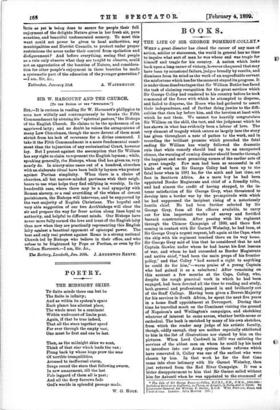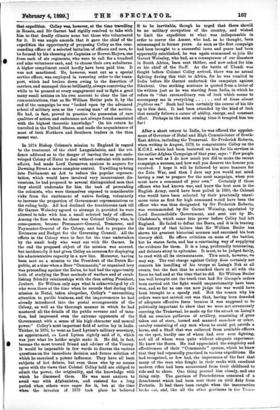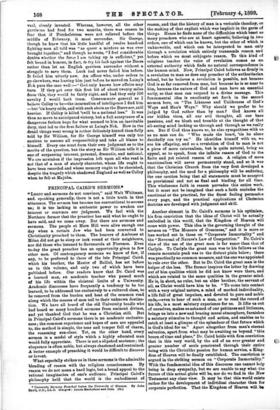BOOKS•
THE LIFE OF SIR GEORGE POMEROY-COLLEY.a
WHEN a great disaster has closed the career of any man of action, soldier or statesman, the world in general has no time to inquire what sort of man he was whose end was tragic for himself and tragic for his country. A nation which looks back upon a long career of victory, however chequered that may have been by occasional failure, judges broadly by results, and dismisses from its mind as the work of an unprofitable servant the misfortune which has for the moment stayed its progress. It is under these disadvantages that Sir William Butler has faced the task of claiming recognition for the great services which Sir George Colley had rendered to his country before he took command of the force with which he attempted to disperse, and failed to disperse, the Boers who had gathered to assert their independence, and of further doing justice to the diffi- culties that then lay before him, and the heroism at least with which he met them. We cannot too heartily congratulate Sir William on the skill, the tact, and the judgment which he has shown in what has evidently been a labour of love. The very element of tragedy which enters so largely into the story has given throughout a note of pathos to the work, and in recording the brilliant promise which preceded the fatal ending Sir William has wisely followed the dramatic rule that while comedy should lead up to an unexpected climax, the warning of coming disaster should breathe through the happiest and most promising scenes of the earlier acts of a great tragedy. Few men had been so successful in all kinds of work as Sir George Colley had been up to the fatal hour when in 1881 he, for the sixth and last time, set foot in Southern Africa. As a mere boy he had been appointed Border Magistrate and chief of a friendly tribe, and had almost the credit of having stopped, to the in. tense satisfaction of Sir George Grey, what threatened to develop into a border war by the promptitude with which he had suppressed the incipient rising of a notoriously hostile chief. He had been further selected by Sir George Grey, from all the officers available, to carry out for him important works of survey and fortified barrack construction. After passing with his regiment through the Chinese Campaign of 1860, and there first coming in contact with Sir Garnet Wolseley, he had been, at Sir George Grey's urgent request, left again at the Cape, when the ship with his regiment touched there on its way home. Sir George Grey said of him that he considered that he and Captain Gawler, under whom he had learnt his first lessons of war, and whom he had succeeded as Border Magistrate and native chief, "had been the main props of his frontier policy," and that Colley " had earned a right to anything he could do for him,"—warm praise of a young Captain who had gained it as a subaltern! After remaining on this account a few months at the Cape, Colley, who, despite the rough practical work in which he had been engaged, had been devoted all the time to reading and study, both general and professional, passed in and brilliantly out of the Staff College. Having been given a Brevet-Majority for his services in South Africa, he spent the next five years in a home Staff appointment at Devonport. During that time he travelled much on the Continent visiting the ground of Napoleon's and Wellington's campaigns, and sketching whatever of interest he came across, whether battle-scene or cathedral. The book is enriched by many of his own sketches, from which the reader may judge of his artistic faculty, though, oddly enough, they are neither especially attributed to him in the list of illustrations nor signed by him on the pictures. When Lord Cardwell in 1870 was enlisting the services of the ablest men on whom he could lay his hand to introduce into our Army system those reforms which have renovated it, Colley was one of the earliest who were chosen by him. In that work he for the first time came into close intimacy with Sir Garnet Wolseley, then just returned from the Red River Campaign. It was a bitter disappointment to him that Sir Garnet sailed without him for Ashanti when he was appointed to the command of • The Life of Sir George Pomeror•Colley, C.B., C.31.6.. 15354881 t Including Berries, in Keffraria, in China, in A xhanti, in India, and in Natal. By Lieutenant-General Sir William F. Butler, R.C.B. With Portrait, Maps, and I lasts ious. Loudon John Murray. 1214.;
that expedition. Colley was, however, at the time travelling in Russia, and Sir Garnet had rigidly resolved to take with him to that deadly climate none but those who volunteered for it. It was ample amends that it gave the chief of the expedition the opportunity of proposing Colley as the com- manding officer of a selected battalion of officers and men, to be formed by his choosing six Captains or Brevet-Majors, one from each of six regiments, who were to call for a hundred and nine volunteers each, and to choose their own subalterns. A higher compliment could hardly have been paid him. It was not sanctioned. He, however, went out as a special service officer, was employed in restoring order to the trans- port, which had broken down owing to the desertion of carriers, and managed this so brilliantly, always contriving the while to be present at every engagement and to fight a good many small actions on his own account to clear the line of communications, that as Sir William Butler puts it, by the end of the campaign he was "looked upon by the advanced school of military men as the ' coming man' of the service. He had, in fact, proved in practice the possession of rare qualities of action and endurance not always found associated with the highest theoretic knowledge." On his return he travelled in the United States, and made the acquaintance of most of both Northern and Southern leaders in the then recent war.
In 1574 Bishop Colenso's mission to England in regard to the treatment of the chief Langalabalele, and the evi- dence adduced as to the danger of leaving the as yet unde- veloped Colony of Natal to deal without restraint with native affairs, had made Lord Carnarvon anxious to acquire for Downing Street a more complete control. Unwilling to bring into Parliament an Act to reduce the popular represen- tation, which would have involved very inconvenient dis- cussions, he bad proposed to several distinguished men that they should undertake for him the task of persuading the colonists, who were themselves exposed to considerable risks from the excitement of native feeling, voluntarily to increase the proportion of Government representatives on the ruling body. All had declined the troublesome task till Sir Garnet Wolseley agreed to attempt it, provided be were allowed to take with him a small selected body of officers. Among the first whom he chose was Colonel Colley, who, in consequence, became Postmaster-General, Treasurer, and Paymaster-General of the Colony, and had to prepare the Estimates and Budget for the Governing Council. All the offices in the Colony were in fact for the time undertaken by the small body who went out with Sir Garnet. In the end the proposed object of the mission was secured, but incidentally it had given Colley an occasion for displaying his administrative capacity in a new line. Moreover, haying been sent on a mission to the President of the Dutch Re- public, at a time when a Boer "Commando," or organised levy was proceeding against the Zulus, he had had the opportunity both of studying the Boer methods of warfare and of estab- lishing friendly relationships with the then acting President, Joubert. Sir William only says what is acknowledged by all who were there at the time when he records that during this mission to Natal, taken altogether, Colley's " unremitting attention to public business, and the improvements he had already introduced into the postal arrangements of the Colony, as well as the thorough manner in which he had mastered all the details of the public revenue and of taxa- tion, had impressed even the extreme opponents of the Government with a sense of his high character and mental power." Colley's next important field of action lay in India. Thither, in 187G, he went as Lord Lytton's military secretary, an appointment, as Lord Lytton rightly said of it, which was just what its holder might make it. He did, in fact, become the most trusted friend and adviser of the Viceroy. It would be impossible in few words to discuss the various questions on the immediate decision and future solution of which he exercised a potent influence. They have all been subjects of hot debate, but even those who by no means agree with the views that Colonel Colley held are obliged to admit the power, the originality, and the knowledge with which he discussed them. He was most anxious to avoid war with Afghanistan, and resisted for a long period when others were eager for it, but at the time when the invasion of 1S78 took place he believed it to be inevitable, though he urged that there should be no military occupation of the country, and wished to limit the expedition to what was indispensable in order to coerce the Ameer, who had, as he thought, been mismanaged in former years. As soon as the first campaign had been brought to a successful issue and peace had been apparently established, he was again summoned to join Sir Garnet Wolseley, who had, as a consequence of our disasters in South Africa, been sent thither, and now asked for him as his chief of the Staff. As the battle of Ulundi was fought before Colonel Colley arrived, there was no actual fighting daring this visit to Africa, for he was recalled to India before Sir Garnet undertook the campaign against Sikukuni. One striking sentence is quoted from a letter of his written just as he was starting from India, in which he refers to " that extraordinary run of luck which seems to accompany me in everything and at times almost frightens me." Such had been certainly the course of his life up to this date. It had been attended by the kind of luck that usually follows a career of ability, energy, and constant effort. Perhaps in the soon coming time it tempted him too far !
After a short return to India, he was offered the appoint- ment of Governor of Natal and High Commissioner of South- East Africa, including the Transvaal. Sir Frederick Roberts, when writing in August, 1879, to congratulate Colley on the K.C.S.I. which had been bestowed on him for his services in the earlier Afghan Campaign of that year, says : " Few people know as well as I do how much you did to make the recent campaign a success, and how well you deserve the honour you received. I hope it will be followed by more honours for the Zulu War, and then I dare say you would not mind having a rest to prepare for the next campaign, when you must have a command of your own." Certainly if those officers who had known war, and knew the best men in the English Army, could have been polled in 1880, the Colonel who would have been selected by their practically unani- mous voice as first for high command would have been the officer who was thus designated by Sir Frederick Roberts, was recommended by Sir Garnet Woiseley, appointed by Lord Beaconsfield's Government, and sent out by Mr. Gladstone's, which came into power before Colley had left England. He failed to defeat the Boers, and it is in tracing the history of that failure that Sir William Butler has shown his greatest historical acumen and exercised his best literary skill. He offers criticism on none of the battles, but he states facts, and has a convincing way of supplying the evidence for them. It is a long, profoundly interesting, and delicate story to epitomise. It must, to be judged fairly, he read with all its circumstances. This much, however, we may say. The real charge against Colley does certainly not concern his handling of his troops at Laing's Nek at all events, but the fact that he attacked there at all with the force he had and at the time that he did. Sir William Butler has well brought out the truth that had Sir George's orders been carried out the fight would unquestionably have been won, and so far as one can now judge the war would have been brought to a speedy end. Bat the reason why his orders were not carried out was that, having been denuded of adequate effective force because it was supposed to be politically important to show that we were not strenuously coercing the Transvaal, he made up for the attack on Laing's Nek an omnium gatherum of artillery, consisting of guns taken out of store, horsed and manned somehow or other, cavalry consisting of any men whom he could put astride a horse, and a Staff that was collected from available officers on the spot, hardly one of whom had ever seen fighting, and all of whom were quite without adequate experience. He knew the Boers. He had appreciated the simplicity and effectiveness of their " Commando " system, which be knew that they had repeatedly practised in various expeditions. He had recognised, as few had, the importance of the fact that many of the men who fought in their ranks with excellent modern rifles had been accustomed from their childhood to ride and to shoot. One thing pressed him closely, and one thing only. The garrison of Potchefstrom consisted of a detachment which had been sent there on civil duty from Pretoria. It had there been caught when the insurrection broke (Jut, and, like all the other garrisons in the TraLs-
veal, closely invested. Whereas, however, all the other garrisons had food for two months, there was reason to fear that if Potchefstrom were not relieved before the middle of February, it must surrender. Sir George, though he knew that his little handful of twelve hundred fighting men all told was " as queer a mixture as was ever brought together," and though be wrote, "I feel considerable doubts whether the fore I an taking up is sufficient," yet felt bound in honour, in fact, to try his luck against the Boers rather than let an English garrison surrender without a struggle to save them. Luck had never failed him before. It felled him utterly now. An officer who, under orders to go elsewhere, was leaving him just before he moved on Laing's NA puts the case well :—" God only knows bow affairs may turn. If they get over this first bit of about twenty miles from this, they would be fairly right, and had they only .500 cavalry I would back them. Consummate general as I believe Colley to be—the incarnation of intelligence I find him —but 'tis heavy odde, and with such shots as the Boers are, still heavier. If Colley is killed 'twill be a national loss." It was thus no move to anticipated victory, but a full acceptance of a dangerous forlorn hope for what seemed to him an inevitable duty, that led to the first failure at Laing's Nek. How in the detail things went wrong is rather delicately hinted than fully told by Sir William, for Sir George himself was only too anxious to assume all responsibility and take all blame to himself. Every one must form their own judgment as to the merits of the question, but the story as Sir William tells it is one of surpassing interest, personal, dramatic, and national. We are mistaken if the impression left -upon all who read is not that of a man of stately character, whose life ought to have been recorded and whose memory ought to be cherished, despite the tragedy which shadowed England as well as Colley when he fell at Majnba.




































 Previous page
Previous page